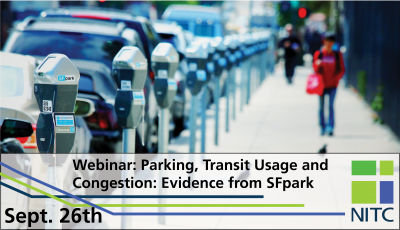
WEBINAR SLIDES
Missed the presentation or want to look back at the slides? View the slides here.
WEBINAR VIDEO
WEBINAR SUMMARY
Parking is a serious issue in many urban areas, especially those experiencing rapid population growth. To address this problem, some cities have implemented demand-responsive pricing programs, where parking prices vary depending on the occupancy rate in a previous period. Yet, few empirical studies have rigorously evaluated these programs. In this study, we investigate the impacts of SFpark, a demand-responsive pricing parking program in San Francisco that began in 2011. We observe effects on three important aspects of urban transportation: parking availability, transit bus ridership and congestion. The timing of this program is plausibly exogenous to factors that affect these outcomes of interest since it is based on bureaucratic decision-making, so endogeneity is less of a concern.
We use data from the SFpark pilot evaluation for on-street parking, which includes hourly data on parking occupancy, metered rates and measures of daily traffic congestion. Additionally, we generate a novel panel data set using micro-level Muni bus transit data at the bus shift-stop level to observe possible effects on modal transportation choice.
Results show that SFpark achieved its primary goal of increasing parking availability, with more on-street parking meeting the target occupancy range of 60-80%. We also make a novel contribution to the literature by addressing the effect of SFPark on transit usage, and find heterogeneous effects on ridership depending on changes in meter rates. A core component of SFpark is allowing metered rates to fluctuate after a few weeks in response to changes in occupancy rates. We leverage these changes in rates and find a positive relationship between rate changes and bus ridership, where a modest increase (decrease) in meter rates is associated with higher (lower) ridership. To our knowledge, this is the first study to assess this relationship using micro-level transit and detailed parking data. Finally, we find SFpark reduced congestion, specifically decreasing traffic density and increasing vehicle speed. These results have important implications for transportation policy as cities continue to expand and implement demand-responsive pricing programs globally.
KEY TAKEAWAYS
- Assess the relationship between parking rates and transit ridership
- Gain an understanding of correlating micro-level transit data and parking data
- Understand policy implications of demand-responsive pricing programs
SPEAKER
Nicole Ngo
Nicole Ngo is an assistant professor at the University of Oregon in the School of Planning, Public Policy, and Management. She received her Ph.D. in Sustainable Development from Columbia University and her research focuses on the intersection of public health and urban sustainability, primarily related to issues around air pollution, transportation and climate change in the U.S. and Africa. Her previous work examined the health impacts of transit bus emission standards, evaluating air quality from roadway emissions in Kenya and Gabon, and the relationship between climate change and infant health in urban areas. She is extending her transportation research to focus on smart-parking policies and modal transportation choice.
PROFESSIONAL DEVELOPMENT
This 60-minute webinar is eligible for 1 hour of professional development credit. NITC applies to the AICP for Certification Maintenance credit for each webinar. We will provide an electronic attendance certificate for other types of certification maintenance.
LEARN MORE
Sign up for our newsletter and opt for "online events" to receive webinar announcements.


